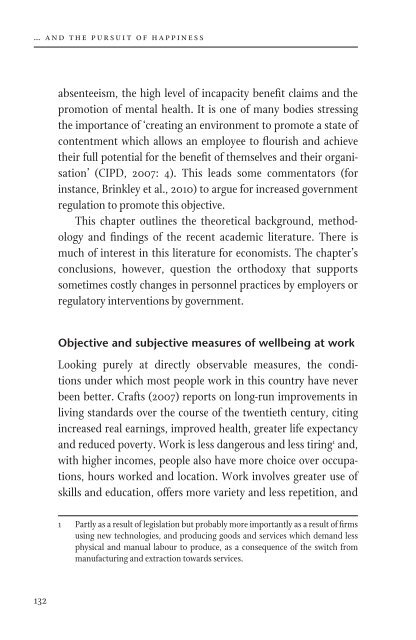… and the Pursuit of Happiness - Institute of Economic Affairs
… and the Pursuit of Happiness - Institute of Economic Affairs
… and the Pursuit of Happiness - Institute of Economic Affairs
Create successful ePaper yourself
Turn your PDF publications into a flip-book with our unique Google optimized e-Paper software.
<strong>…</strong> <strong>and</strong> <strong>the</strong> pursuit <strong>of</strong> happiness<br />
wellbeing at work: any lessons?<br />
absenteeism, <strong>the</strong> high level <strong>of</strong> incapacity benefit claims <strong>and</strong> <strong>the</strong><br />
promotion <strong>of</strong> mental health. It is one <strong>of</strong> many bodies stressing<br />
<strong>the</strong> importance <strong>of</strong> ‘creating an environment to promote a state <strong>of</strong><br />
contentment which allows an employee to flourish <strong>and</strong> achieve<br />
<strong>the</strong>ir full potential for <strong>the</strong> benefit <strong>of</strong> <strong>the</strong>mselves <strong>and</strong> <strong>the</strong>ir organisation’<br />
(CIPD, 2007: 4). This leads some commentators (for<br />
instance, Brinkley et al., 2010) to argue for increased government<br />
regulation to promote this objective.<br />
This chapter outlines <strong>the</strong> <strong>the</strong>oretical background, methodology<br />
<strong>and</strong> findings <strong>of</strong> <strong>the</strong> recent academic literature. There is<br />
much <strong>of</strong> interest in this literature for economists. The chapter’s<br />
conclusions, however, question <strong>the</strong> orthodoxy that supports<br />
sometimes costly changes in personnel practices by employers or<br />
regulatory interventions by government.<br />
Objective <strong>and</strong> subjective measures <strong>of</strong> wellbeing at work<br />
Looking purely at directly observable measures, <strong>the</strong> conditions<br />
under which most people work in this country have never<br />
been better. Crafts (2007) reports on long-run improvements in<br />
living st<strong>and</strong>ards over <strong>the</strong> course <strong>of</strong> <strong>the</strong> twentieth century, citing<br />
increased real earnings, improved health, greater life expectancy<br />
<strong>and</strong> reduced poverty. Work is less dangerous <strong>and</strong> less tiring 1 <strong>and</strong>,<br />
with higher incomes, people also have more choice over occupations,<br />
hours worked <strong>and</strong> location. Work involves greater use <strong>of</strong><br />
skills <strong>and</strong> education, <strong>of</strong>fers more variety <strong>and</strong> less repetition, <strong>and</strong><br />
1 Partly as a result <strong>of</strong> legislation but probably more importantly as a result <strong>of</strong> firms<br />
using new technologies, <strong>and</strong> producing goods <strong>and</strong> services which dem<strong>and</strong> less<br />
physical <strong>and</strong> manual labour to produce, as a consequence <strong>of</strong> <strong>the</strong> switch from<br />
manufacturing <strong>and</strong> extraction towards services.<br />
gives more opportunities for interaction with fellow workers<br />
<strong>and</strong> customers or clients. Although no job is ever wholly secure,<br />
unwanted levels <strong>of</strong> casual employment (such as those that used to<br />
prevail in <strong>the</strong> docks) are largely a thing <strong>of</strong> <strong>the</strong> past.<br />
The average ‘quality’ <strong>of</strong> jobs, measured by this type <strong>of</strong> ob jective<br />
indicator, has surely risen dramatically over <strong>the</strong> last century. And<br />
<strong>the</strong>se jobs are available to a wider range <strong>of</strong> <strong>the</strong> population, with<br />
women now accounting for almost 50 per cent <strong>of</strong> <strong>the</strong> workforce. 2<br />
But most <strong>of</strong> <strong>the</strong> focus in <strong>the</strong> literature is on states <strong>of</strong> mind<br />
ra<strong>the</strong>r than objective aspects <strong>of</strong> <strong>the</strong> work environment. Subjective<br />
wellbeing at work comprises a number <strong>of</strong> elements – physical <strong>and</strong><br />
mental health, social interaction <strong>and</strong> satisfaction with a range <strong>of</strong><br />
job attributes. Psychologists (for example, Robertson <strong>and</strong> Cooper,<br />
2011) distinguish between two facets <strong>of</strong> personal wellbeing<br />
deriving from work – ‘hedonic’, meaning subjective pleasure,<br />
happiness <strong>and</strong> positive feelings, <strong>and</strong> ‘eudaimonic’, involving a<br />
sense <strong>of</strong> purpose, personal growth <strong>and</strong> <strong>the</strong> conviction that one has<br />
respect <strong>and</strong> a place in society.<br />
The research flowing from this focuses on using survey data to<br />
help identify factors (including both personal attributes <strong>and</strong> job<br />
2 There may be fluctuations in job quality over shorter periods. There is some<br />
evidence (Green, 2004; Brown et al., 2006) to suggest that work intensity rose<br />
in <strong>the</strong> 1990s in <strong>the</strong> UK as a result <strong>of</strong> closer monitoring facilitated by changes in<br />
work organisation <strong>and</strong> computer technology; this was regarded as oppressive by<br />
some groups <strong>of</strong> workers. Intensity did not, however, continue to increase into <strong>the</strong><br />
new century <strong>and</strong> between 1998 <strong>and</strong> 2004 <strong>the</strong>re appears to have been a significant<br />
improvement in many aspects <strong>of</strong> job quality, including training, employment security<br />
<strong>and</strong> <strong>the</strong> degree <strong>of</strong> influence individuals had over <strong>the</strong>ir work (Michie et al.,<br />
2008). Moreover, Green (2011) <strong>and</strong> Waldfogel (2011), reviewing a slightly longer<br />
period, argue that, over <strong>the</strong> term <strong>of</strong> <strong>the</strong> last government, pay rose, hours <strong>of</strong> work<br />
fell <strong>and</strong> new employment ‘rights’ (such as enhanced parental leave) were made<br />
available, thus fur<strong>the</strong>r improving <strong>the</strong> directly observable quality <strong>of</strong> people’s work<br />
experience.<br />
132 133












